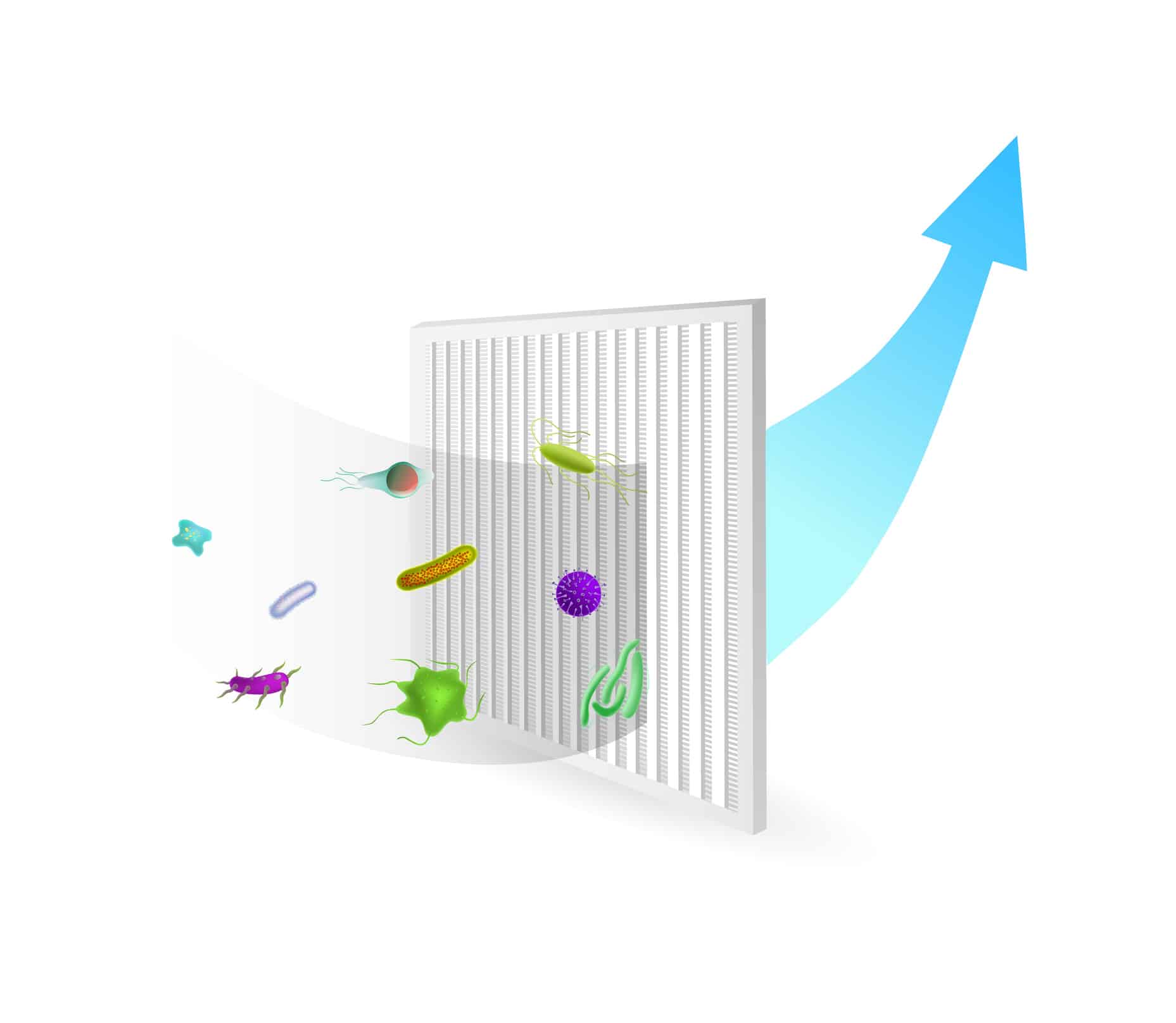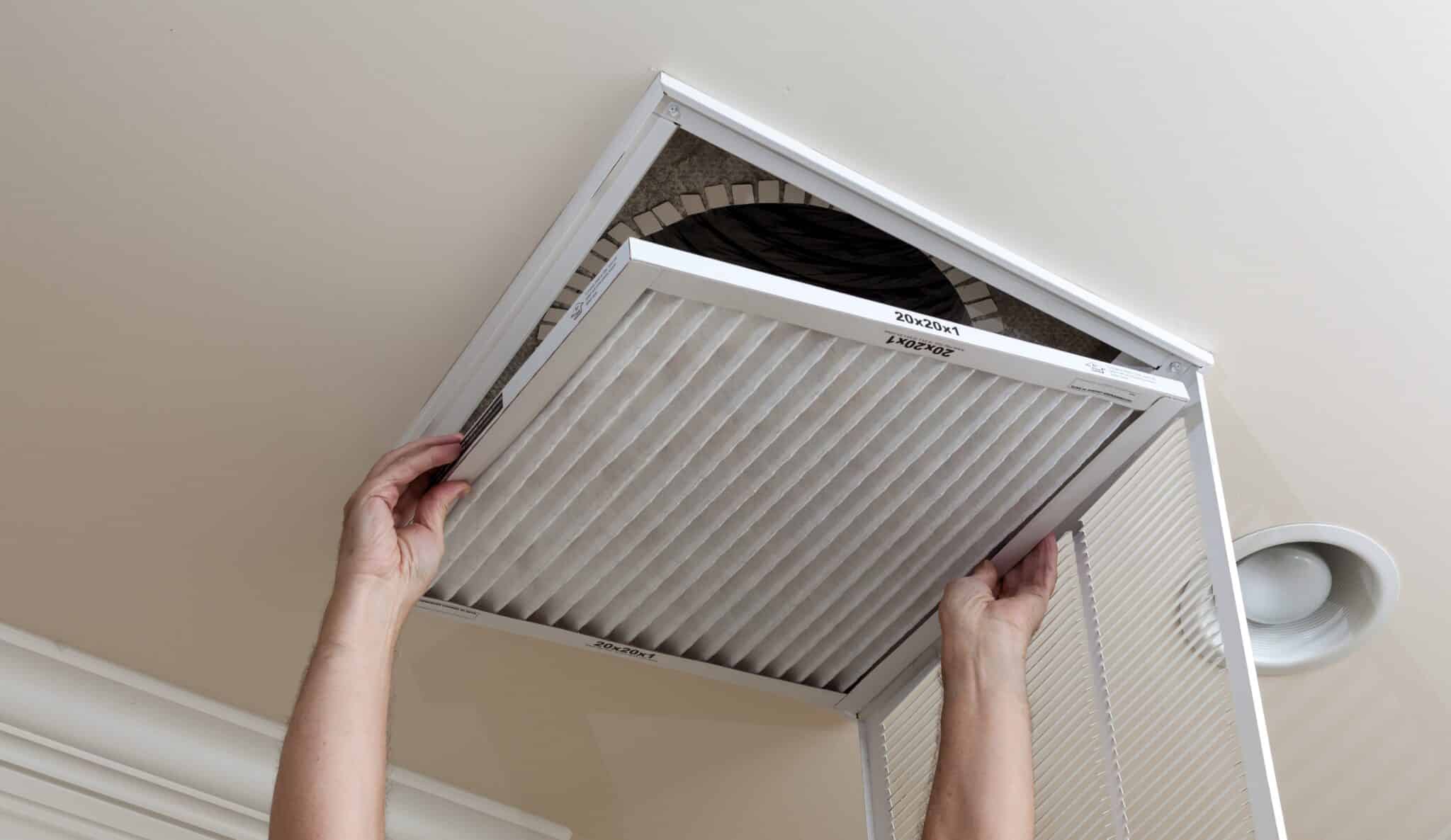Air filters play a vital role in maintaining the air quality and efficiency of HVAC systems in Ogden homes. With seasonal changes and varying air quality, especially during October, dust, allergens, and pollutants can easily enter your living space. Choosing the right air filter helps combat these challenges, ensuring cleaner air and a healthier home environment.
Understanding Different Types of Air Filters
Choosing the right air filter for your Ogden home is essential for maintaining clean air and HVAC efficiency. The most common types of filters are fiberglass, pleated, HEPA, and electrostatic, each offering different levels of filtration with unique benefits and drawbacks.
-
Fiberglass Filters
Fiberglass filters are the most basic and inexpensive option, designed mainly to protect your HVAC system from large particles like dust. While affordable, they offer minimal filtration for smaller particles such as pollen and mold spores, making them less effective for improving indoor air quality.
-
Pleated Filters
Made from cotton or polyester, pleated filters have a larger surface area that captures smaller particles like dust mites, pet dander, and pollen. They come in various MERV ratings, indicating their filtration efficiency. While they provide better air quality than fiberglass filters, high-rated pleated filters can restrict airflow if not matched correctly to your HVAC system.
-
HEPA Filters
HEPA filters trap 99.97% of airborne particles as small as 0.3 microns, including allergens and bacteria. They are ideal for those with allergies or asthma but may not be compatible with all HVAC systems due to their density.
-
Electrostatic Filters
These filters use self-charging fibers to capture particles and are available in disposable and washable versions. They provide good filtration but require regular maintenance to maintain their efficiency.
Selecting an air filter that suits your specific needs can significantly enhance your home’s air quality and overall comfort.

How Air Quality Affects Your Home in October
October in Ogden brings unique air quality challenges that can impact your home’s indoor environment. Seasonal changes, cooler temperatures, and increased allergens make this month a critical time to focus on maintaining clean air. Understanding how these factors affect indoor air quality helps you make informed decisions about filtration to keep your home safe and comfortable.
As temperatures drop, outdoor allergens such as ragweed, mold spores, and decaying leaves become prevalent. Mold spores released from fallen leaves can easily enter your home through open doors and windows or attach to clothing and pets. Once inside, these particles can trigger allergic reactions, asthma flare-ups, and respiratory problems, especially for vulnerable groups like children, seniors, and individuals with chronic health conditions.
October also marks the start of the heating season, introducing new challenges. When you turn on your furnace for the first time, dust, pet dander, and other particles that have settled in your HVAC system are often blown into your living space. This can significantly degrade indoor air quality, making the air feel stale and polluted. The added use of fireplaces and the occasional inversion layer trapping pollutants in the valley only worsens the situation, creating an environment filled with irritants.
Choosing the right air filter can help combat these seasonal air quality issues. High-efficiency filters are designed to capture smaller particles like mold, dust mites, and pet dander, providing a cleaner and healthier indoor environment. By addressing these pollutants, you improve not only the air you breathe but also the overall comfort of your home during the fall season.
Taking steps to recognize and address these air quality challenges in October allows you to keep your home’s indoor air fresh and safe. The right air filter can make a significant difference, ensuring your living space remains a haven of clean air as you prepare for the cooler months ahead.
Factors to Consider When Choosing an Air Filter
When selecting an air filter for your home, it’s important to consider factors such as MERV ratings, efficiency, cost, and your specific needs. The right filter can significantly improve indoor air quality, enhance HVAC performance, and create a healthier environment for your family. Knowing what to look for will help you make the best choice.
MERV Ratings Explained
The Minimum Efficiency Reporting Value (MERV) rating measures a filter’s effectiveness in capturing particles. Ratings range from 1 to 20, with higher numbers indicating better filtration. For most residential settings, a MERV rating between 8 and 13 is recommended. These filters effectively capture common pollutants like dust, pollen, mold spores, and pet dander without overly restricting airflow. However, filters rated above 13, while highly effective, can sometimes reduce HVAC efficiency and increase energy costs if your system isn’t designed to handle them.
Balancing Efficiency, Cost, and Your Home’s Needs
Higher-rated filters capture more contaminants, but they can also be more expensive and require frequent replacements. It’s crucial to find a balance between cost, efficiency, and your HVAC system’s capabilities. High-efficiency filters are ideal for homes with allergy sufferers, pets, or high pollution levels but may not be necessary for every household. Moderate MERV-rated filters often provide a good balance, offering effective filtration at a reasonable cost.
Understanding Your Home’s Specific Needs
Every home has unique air quality challenges based on its occupants and location. If you have pets, suffer from allergies, or live in an area with high outdoor pollutants, a higher MERV-rated filter might be necessary to maintain clean air. Additionally, consider how often you’re willing to replace the filter. Some high-efficiency filters need to be replaced monthly, while others can last up to three months, impacting your maintenance routine and long-term costs.
Choosing the right air filter means evaluating these factors and finding the best fit for your home. By understanding MERV ratings, balancing efficiency and cost, and considering your household’s specific needs, you can improve your indoor air quality, protect your HVAC system, and ensure a healthier living space.
Best Air Filters for Pet Owners in Ogden
For pet owners in Ogden, maintaining good indoor air quality is crucial due to the presence of pet hair, dander, and odors. The right air filter can effectively capture these particles, improving air quality and making your home more comfortable. Here are the best filters suited for homes with pets, focusing on capturing pet dander and odors.
-
HEPA Filters
High-efficiency particulate Air (HEPA) filters are among the most effective options for pet owners. They capture 99.97% of airborne particles as small as 0.3 microns, including pet dander, dust, and allergens. HEPA filters are ideal for homes with multiple pets or allergy sufferers because they provide superior filtration, keeping your air clean and healthy. However, their dense structure may not suit all HVAC systems, so it’s important to ensure compatibility before installation.
-
Activated Carbon Filters
If pet odors are a concern, activated carbon filters are the go-to choice. These filters use a layer of activated charcoal to absorb and neutralize unpleasant smells, leaving your home smelling fresh. While not as efficient at capturing fine particles as HEPA filters, they are excellent at managing odors. Combining an activated carbon filter with another filter type can offer a dual approach to controlling both dander and smells.
-
Electrostatic Filters
Electrostatic filters utilize self-charging fibers to attract and capture particles like pet hair, dander, and dust. Available in both disposable and washable versions, they provide a practical and cost-effective solution for pet owners. Washable options are particularly beneficial as they can be reused after cleaning, reducing waste. However, to maintain performance, these filters require regular upkeep.
-
Pleated Filters with High MERV Ratings
Pleated filters with MERV ratings between 8 and 13 strike the right balance for pet owners. These filters effectively capture pet hair, dander, and other allergens without overly restricting airflow. They offer a good middle ground between basic and high-efficiency filters, making them suitable for most homes with pets.
Finding the perfect air filter for your pet-friendly home starts with understanding your specific needs, like dander control and odor elimination. The right filter ensures cleaner air, a fresher atmosphere, and a healthier space for you and your pets.
Energy Efficiency and Air Filters: Saving on Utility Bills
Selecting the right air filter is a powerful way to boost your HVAC system’s performance and cut down on energy costs. A well-chosen filter can enhance airflow, reduce strain on your system, and keep your home running efficiently—all of which translate into real savings on your utility bills.
High-MERV filters capture more particles but can also restrict airflow, causing your HVAC system to work harder and use more energy. For most homes, filters with a MERV rating between 8 and 13 strike the perfect balance, effectively removing dust, allergens, and pet dander without compromising efficiency. This not only protects your HVAC system but also ensures it operates at peak performance, reducing overall energy use.
Maintaining your air filter is just as crucial. A clogged filter blocks airflow, forcing your system to overwork and driving up your energy bills. Replacing filters every 30 to 90 days keeps airflow smooth, reduces energy consumption, and extends the life of your HVAC unit.
Investing in the right air filter and staying on top of maintenance can make a significant impact on your home’s energy efficiency. It’s a small step that leads to lower bills, a more comfortable home, and a healthier environment for you and your family.
Maintenance Tips: How Often Should You Change Your Air Filter?
Regular air filter maintenance is key to keeping your HVAC system efficient and your home’s air quality high. The frequency with which you should change your air filter depends on the type of filter, the conditions in your home, and how often your HVAC system runs. Knowing the right timing helps prevent system strain, reduces energy costs, and ensures a healthier indoor environment.
Frequency of Filter Changes
For basic fiberglass filters, replacement every 30 days is recommended as they capture only larger particles. Pleated filters, which are more effective at capturing dust, pollen, and pet dander, typically last 60 to 90 days. HEPA filters, known for their superior filtration, can last up to six months but may need more frequent changes in homes with pets or allergy sufferers. High usage, multiple pets, or living in a high-pollution area may require even more frequent filter changes to keep your air clean.
Signs Your Air Filter Needs Replacement
Pay attention to signs like visible dirt buildup on the filter, increased dust in your home, or reduced HVAC performance. If you notice higher energy bills, musty odors, or more frequent allergy symptoms, these are clear indicators that your filter needs replacing. A dirty filter restricts airflow, making your HVAC system work harder, leading to increased energy consumption and potential damage.
Proactive Maintenance
Set reminders to check your filter regularly, and keep a spare on hand for quick changes. Routine maintenance not only keeps your system running smoothly but also extends its lifespan and improves overall indoor air quality.
For professional guidance on air filter maintenance, contact One Hour Heating & Air Conditioning of Ogden, UT today. Our experts can help you choose the right filter and maintain your HVAC system for peak performance.

Air Filters and Health: Protecting Your Family’s Well-being
Air quality directly affects your family’s health, especially for vulnerable groups like children, the elderly, and those with respiratory issues. Poor indoor air quality can aggravate allergies, trigger asthma attacks, and even lead to long-term health problems. Investing in the right air filter is a simple yet powerful way to safeguard your family’s well-being.
High-efficiency air filters, such as HEPA and pleated filters with high MERV ratings, are designed to capture fine particles like dust, pollen, pet dander, and mold spores. These contaminants can worsen symptoms for allergy and asthma sufferers, making it essential to choose a filter that effectively removes these irritants. High-efficiency filters help create a cleaner, healthier environment, significantly reducing respiratory flare-ups and improving overall comfort.
For children and the elderly, who are particularly sensitive to air pollutants, maintaining clean indoor air is crucial. Contaminants in the air can weaken immune systems and exacerbate conditions like bronchitis and other respiratory illnesses. By using a high-quality air filter, you reduce exposure to harmful particles, enhancing your family’s health and quality of life.
Prioritizing air filter maintenance ensures your home remains a safe haven. For expert advice on choosing the best filter for your family’s needs, contact One Hour Heating & Air Conditioning of Ogden, UT today. We’re here to help you breathe easier.
Common Air Filter Myths Debunked
Misconceptions about air filters can lead to ineffective choices that impact your HVAC system and home air quality. Understanding the facts helps you make informed decisions to keep your home comfortable and healthy.
Reusable Filters Are Better and Save Money. While reusable filters may seem economical, their performance decreases with each wash, making them less effective at capturing fine particles like dust, pollen, and pet dander. In contrast, disposable filters, especially pleated ones with high MERV ratings, consistently capture more allergens, providing superior protection for your air quality and HVAC system.
Higher MERV Ratings Are Always Better. A higher MERV rating means better filtration, but it can also restrict airflow, forcing your HVAC system to work harder and increasing energy consumption. For most homes, a MERV rating between 8 and 13 offers the best balance, capturing pollutants effectively without straining your system.
You Only Need to Replace Filters When They Look Dirty. Relying on visual cues can lead to clogged filters that reduce HVAC efficiency. Filters should be replaced every 30 to 90 days, depending on factors like home environment, pets, and allergies.
Don’t let these myths compromise your home’s air quality. Contact One Hour Heating & Air Conditioning of Ogden, UT today for expert guidance on selecting and maintaining the right air filter.
Contact Us Today
Enhance your home’s comfort and air quality with One Hour Heating & Air Conditioning of Ogden, UT. Our expert team is here to assist with filter selection, maintenance, and comprehensive HVAC services.
Contact us today to schedule your consultation and breathe easier with professional support from One Hour Heating & Air Conditioning of Ogden, UT.
FAQs: Choosing the Right Air Filter
-
What is the best air filter for allergies?
High-efficiency particulate Air (HEPA) filters or pleated filters with a MERV rating of 8-13 are best for allergies. They capture allergens like dust, pollen, and pet dander, providing cleaner air for allergy sufferers.
-
How does the MERV rating affect HVAC performance?
MERV ratings indicate a filter’s ability to capture particles. Higher ratings mean better filtration but can restrict airflow if too high, potentially straining your HVAC system and increasing energy costs.
-
Can I use any filter size for my HVAC system?
No, your filter must match the exact size specified by your HVAC system. Incorrect sizes can allow unfiltered air to bypass the filter, reducing effectiveness and system efficiency.
-
How do I know if my air filter is working effectively?
Check for visible dust and debris on the filter. Reduced airflow, increased dust around your home, or rising energy bills can indicate the filter needs replacing.
-
Are expensive air filters worth the cost?
Expensive filters often provide better filtration, especially for homes with allergies or pets. However, balance cost with your home’s specific needs and system requirements.





